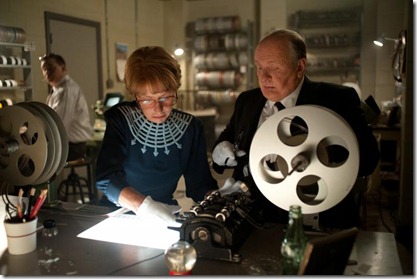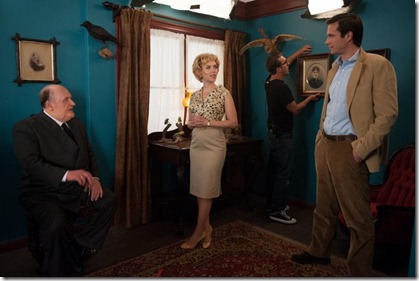Hitchcock is a fabulist take on Hitchcock’s life while making Psycho. It opens with Hitchcock introducing the film in a manner we can recognise from television’s classic Alfred Hitchcock Presents following a murder that will play into the story in a pretty dramatic (and also cheeky) way.
Shot in vibrant colors that echo some of Hitch’s (Anthony Hopkins) best work, Hitchcock goes in some strange directions, mixing fact with speculation and outright fantasy. It unashamedly goes for laughs on every level from practically slapstick to subtle but has no qualms from going straight from comedy to melodrama.
In keeping with the film styles and mores of the time, Hitch and his wife Alma Reville (Helen Mirren) sleep in separate beds and rarely show any affection beyond a chaste kiss. We are to deduce their love and devotion from small hints sprinkled amongst their bursts of small talk and her attempts to keep him from getting away with some of his bad habits – like booze and high-calorie food. She puts up with his fascination with the beautiful blondes he works with – in this case, Jane Leigh (Scarlett Johansson).
Naturally, he has little tolerance when he thinks she might be having an affair with devilishly handsome Whitfield Cook (Danny Huston) – the screenwriter who was credited with the adaption of Strangers on a Train for Hitch. The implication is that Alma is the real talent behind many of Hitch’s scripts – we know that she helped edit his films, provided script revisions and even directed a key scene (or insured that it was shot the way Hitch wanted) when the director was sick in bed.
Some of the other facts included the manner in which Hitch financed Psycho (mortgaged the house) when no studio would give him the financing for a mere horror film, and the lack of support from Paramount in releasing it (to two theaters, with little to no marketing – that was dreamt up by Hitch).
The fantasy includes the degree to which Hitch fixated on his blonde stars (the movie may actually soft pedal that; therein lies the fantasy) and further encounters with Ed Gein (Michael Wincott) – Psycho, of course, being Robert Bloch’s fictionalization of Gein’s murders.
The fun of the movie is the relationship between Hitch and Alma, and Hopkins and Mirren work that in fun ways – with Alma coming off as both loving and tougher than the legendary director. Huston is also perfectly oily as the screenwriter who has a thing for Alma that she won’t let get beyond the flirting stage.
James D’Arcy does a good job of capturing Anthony Perkins’ unusual energy and Michael Stuhlbarg makes the perfect agent as Lew Wasserman. Toni Collette is also fine as Hitch’s secretary/assistant, Peggy Robertson – as are Kurtwood Smith (combative censor Geoffrey Shurlock) and Ralph Macchio (writer Joseph Stefano – who went on to do the original The Outer Limits).
Where the film stumbles a bit is the casting of Janet Leigh (Johansson) and Vera Miles (Jessica Biel). Neither comes close to capturing these two formidable actors but that’s as much the writing as it is anything else.
Hitchcock is not a great film, but it does match the feel of sixties movies in a way that doesn’t feel false or overly gratuitous. Director Sacha Gervasi rides the ragged edge of camp with a verve that makes up for its uneven writing (by John J. McLaughlin from the book by Stephen Rebello) – and when he gets its comedy and melodrama right, it sings. The result may be incredibly tacky, but it’s also pretty disposable – it won’t stay with you for long after you live the theater, but you’ll have fun while you’re there.
In awards-bait season, that is a particular kind of pleasure that should not be dismissed lightly.
Final Grade: B
Photos by Suzanne Tenner/Courtesy of Fox Searchlight Pictures

